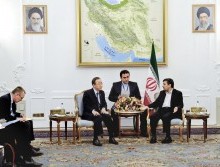
Protestors in the region are taking on Iran’s leaders and malign influence.
Illustrative official meeting in Iran. Photo Courtesy of UN Photo/Evan Schneider
Protests are making an impact in Iraq, and it’s not just the leaders in Baghdad that are feeling the pressure. Leaders in Iraq’s next-door neighbor and general bad influence Iran are taking notice too, as Iraqi protestors have opposed Tehran’s entanglement in their country. “Iraqis increasingly view Iran as having coopted and exploited Iraq’s political system, its economy, and its security at the expense of the Iraqi people, and this has clearly made Iran nervous,” said United States Assistant Secretary of State for Near Eastern Affairs David Schenker in comments to reporters on Monday.
Schenker, whose statement was published by the State Department, noted that Major General Qasem Soleimani—the commander of Iran’s international special operations unit the Qods Force—was back in Baghdad “interfering in Iraqi politics.”
Said Schenker, “As Iraqi leaders consider options over the coming days to address the current crisis, their foremost consideration should be meeting the needs of the Iraqi people and rejecting the distorting influence Iran has exerted on the political process.”
The US diplomat went on to condemn Iraqi violence against peaceful protestors, highlighting the over 400 Iraqis who have been killed. He urged the Iraqi government to investigate those who “attempt to brutally silence peaceful protesters” and hold such persons accountable.
“The Iraqi people are calling for genuine reform and for trustworthy leaders that will put Iraq’s national interests first,” said Schenker. “As I said last week, the Iraqis are fed up with economic stagnation, endemic corruption, and mismanagement. They want better from their leaders.”
Iran not only has trouble in their regional partner, but at home as well. Amnesty International on Monday revised their death toll for protests in Iran that began in mid-November to at least 208. In a report posted to their website, Amnesty solemnly said of the number of dead that the “real figure is likely to be higher.” Amnesty noted they have verified video footage showing Iranian security forces opening fire at unarmed protesters.
Amnesty’s Research and Advocacy Director for the Middle East and North Africa, Philip Luther, expressed horror at the actions of Iran’s government. “This alarming death toll is further evidence that Iran’s security forces went on a horrific killing spree, that left at least 208 people dead in less than a week,” Luther was quoted in the report as saying. “This shocking death toll displays the Iranian authorities’ shameful disregard for human life.”
Luther went on to call for the international community to hold Iran accountable, as “Iranian authorities have previously shown they are unwilling to carry out independent, impartial and effective investigations into unlawful killings and other arbitrary use of force against protesters.”
Yet instead of sanctioning Iran, six European nations recently joined a program aimed at evading US sanctions on Iran. The approach is an effort to economically prop up the collapsing Iran nuclear deal by reducing the impact of American sanctions to benefit Iran. Israeli Director General of the Ministry of Foreign Affairs Yuval Rotem took to Twitter to tell Belgium, Denmark, Finland, the Netherlands, Norway, and Sweden to “reconsider this decision.”
“This cannot be the right message to the men, women and children suffering brutal oppression by the Iranian regime,” tweeted Rotem.
Commenting on a report on the Iran protests by The New York Times, Rotem later tweeted that “the Iranian regime’s brutal oppression of the #IranProtests left hundreds dead & thousands wounded, and revealed the staggering levels of frustration of Iranians with their leaders.”
The brutality in Iran goes beyond violence. Amnesty International’s press release said their information indicates that Iran has intimidated the victims’ families not to talk to the media or even to hold funerals for the murdered protestors.
(By Joshua Spurlock, www.themideastupdate.com, December 3, 2019)
